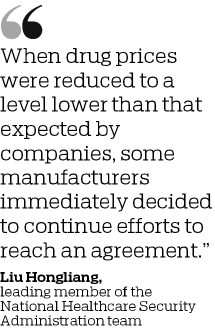We felt enormous pressure on our shoulders, says price talks team member

Delegates taking part in last year's negotiations on drug prices experienced both a sense of being under pressure and of responsibility, according to Liu Hongliang, a leading member of the National Healthcare Security Administration team.
"During the negotiations, we had to consider public expectations and the healthcare insurance fund's ability to pay, as well as the interests of pharmaceutical companies and the costs of drug research and development," said Liu, deputy director of the Jilin Provincial Healthcare Insurance Administration in Changchun, Jilin province.
"We had to strike a balance, and felt enormous pressure on our shoulders."
All drugs on the list for the negotiations had been carefully selected and were needed urgently by patients, he said.
"The drugs on the list are relatively costly, and many patients will still find that they cannot afford them, even if they are included in the basic healthcare insurance program for reimbursement, unless the prices are reduced."
For example, in Jilin, he said that due to improved healthcare and preferential policies, patients living in poverty now only have to pay 10 percent of their medical expenses. However, because many of them are on low incomes, they may still struggle to foot their bills.
After years of efforts covering more than 95 percent of the population, China has built the world's largest basic medical insurance network, according to official data. However, healthcare varies in different areas, with insurance subscribers' medical bills reimbursable at a range of rates among different groups of people.
Before last year's negotiations, which resulted in 70 new drugs being included on the reimbursement list, such talks had been held for several years, and their success had given experts from the National Healthcare Security Administration more confidence, Liu said.
In addition, with bulk purchases of drugs, the administration's position in the negotiations has greatly improved in recent years, he said, adding that cooperation from pharmaceutical companies involved in the talks is also key to their success.
"When drug prices were reduced to a level lower than that expected by companies, some manufacturers immediately decided to continue efforts to reach an agreement," he said.
Some companies changed their strategies to reduce operating costs, enabling prices to be lowered further and agreements to be reached, Liu added.

Today's Top News
- Trump threatens 10% tariffs on 8 NATO allies
- PLA monitors US naval vessels transiting the Taiwan Strait
- The high cost of US cutting vaccine funding
- Visit highlights China's importance
- China fortifies energy security as risks rise
- Taiwan separatists warned of action






























